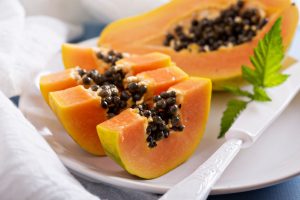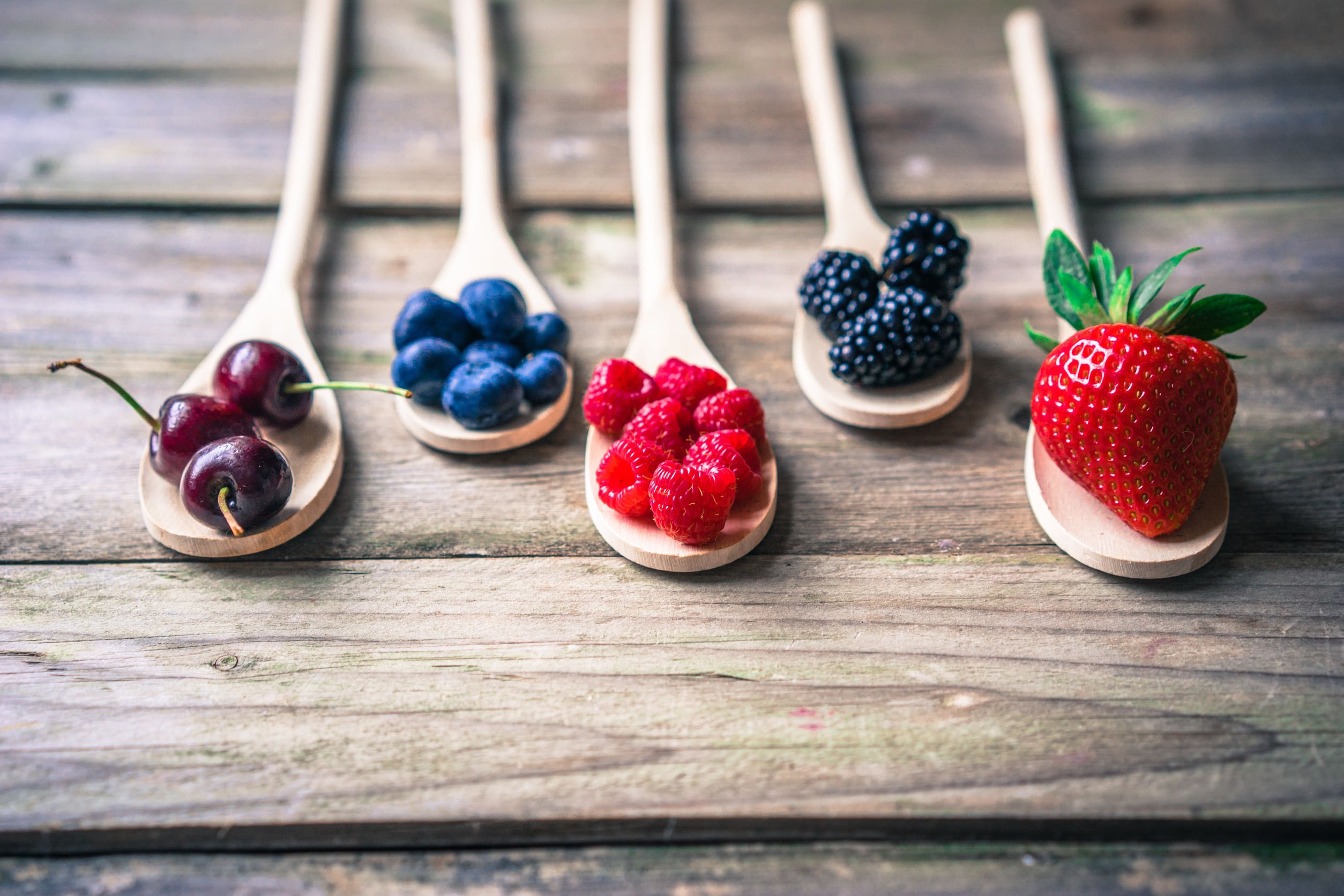The connection between nutrition and premature aging has been a popular topic since ancient times. In contemporary culture, healthy skin can project a general feeling of well-being and proper aging.1 Eating the right balance of fruits and vegetables may help give your skin some of the nutrients it needs to stay vital and supple.2
Fresh fruit provides an excellent source of vitamins and minerals. Many fruits can not only support weight loss but also may have beneficial properties for the skin.
Fruits that are especially beneficial for skin health include:
- Strawberries
- Blackberries
- Avocados
- Grapefruit
- Pumpkins
Let’s take a closer look at each.
Strawberries
Like many fruits on this list, strawberries are an excellent source of vitamin C. This vitamin helps fight free radicals that can destroy collagen. Strawberries also contain polyphenols, which help protect your skin against sun-related damage. And, along with blackberries and raspberries, they are an excellent source of ellagic acid – an antioxidant that may help reduce the appearance of dark spots on the skin.3,4
Blackberries
 Blackberries also contain lots of vitamin C. Blackberries also contain dietary fiber, which can help support healthy blood sugar levels. They are a potent source of antioxidants like anthocyanin, which may help slow the damage that free radicals cause.5
Blackberries also contain lots of vitamin C. Blackberries also contain dietary fiber, which can help support healthy blood sugar levels. They are a potent source of antioxidants like anthocyanin, which may help slow the damage that free radicals cause.5
Avocados
Avocados (yes, they are indeed fruits) contain essential fatty acids that are essential for skin health. They also act as a natural skin moisturizer. And the vitamin E in avocados may help protect against free radical damage.6
Grapefruit
Grapefruit is another fruit that has a very high concentration of vitamin C. Pink Grapefruit also contains high concentrations of lycopene. This substance may provide some natural protection against sun damage.7 Grapefruits also contain bioflavonoids. These can support the skin’s production of collagen.8
Pumpkin
Pumpkins may have natural skin-rejuvenating effects, thanks in part to their beta carotene content. The retinol produced in your body from the beta carotene may help with the appearance of wrinkles and UV damage. The alpha-hydroxy acid in pumpkins, when applied topically, can remove dead skin cells and support healthy cell turnover, so consider a pumpkin face mask for really radiant skin9
Eating Fruit For Skin Is Great, But You May Need More
You now know that eating fruit can provide some skin health benefits. However, it can be hard to get enough nutrients from food alone to really feed your skin what it needs to thrive. Another way to maintain healthy skin may be through dietary supplements and specially formulated skin-care products.

Skin Care Vitamins: Vitamin C, Powerful Antioxidants, And More
Your daily diet appears to influence the way that your skin ages. There is also a lot of research around the skin health and beauty-promoting effects of the following substances:
- Antioxidants like carotenoids, tocopherols, and flavonoids
- Vitamins such as A, C, and E
- Omega-3 fatty acids10
Let’s take a closer look.
Vitamin C
Vitamin C is a very important natural antioxidant. But the human body does not produce vitamin C on its own, so it must be consumed through food or supplementation.
Topical vitamin C can help protect the skin against damage from the sun’s ultraviolet radiation. A diet rich in vitamin C has also been shown to reduce the appearance of wrinkled skin.11,12
Vitamin E
Vitamin E is actually a group of antioxidants that function to protect cells from the damage caused by free radicals.
Vitamin E works together with vitamin C to help reduce oxidative stress caused by ultraviolet damage.13
Avocados and sweet red peppers are fruits that are high in vitamin E.
Carotenoids
Carotenoids are another important class of antioxidants. Carotenoid antioxidants include beta carotene, lycopene, astaxanthin, and retinol.
 Fruits that contain beta carotene include pumpkins, butternut squash, cantaloupes, and apricots.14Lycopene-containing fruits include tomatoes, persimmons, watermelons and papayas.15
Fruits that contain beta carotene include pumpkins, butternut squash, cantaloupes, and apricots.14Lycopene-containing fruits include tomatoes, persimmons, watermelons and papayas.15
Both beta carotene and lycopene have been shown to help protect the skin against the harmful rays of the sun.16
Polyphenols
Polyphenols are antioxidants that are found in many fruits, fruit juices, and in green tea. Polyphenols may also help to fight damaging free radicals.17
Oranges, apples, grapes, grapefruit, blackberries, and strawberries all contain generous amounts of polyphenols. Yet the amount of polyphenols present in fruits can quickly fall by cooking. The longer the fruit cooks, the fewer polyphenols remain.18
Essential Fatty Acids
Essential fatty acids include omega-3 and omega-6 fatty acids. The human body can’t make them naturally, so they must be consumed through food or supplementation.19 Fruits and veggies containing these fatty acids include:
- Hemp seeds
- Flaxseeds
- Chia seeds
- Pumpkin seeds
- Green leafy vegetables
- Avocados
Omega-6 fatty acids have been shown to have hydrating skin properties.20
Beyond Fruits: Making Your Skin Glow
In addition to fruits, yogurt, dark chocolate, and olive oil may also benefit your skin.
Both plain yogurt and Greek yogurt contain lactic acid, an alpha hydroxy acid (AHA). AHA can have skin-hydrating properties.21
 Dark chocolate contains flavonols, which may help protect skin from damaging UV rays.22 Regular chocolate does not have this effect, though, because the flavonols are reduced in the manufacturing process, and skin-damaging sugar is increased.
Dark chocolate contains flavonols, which may help protect skin from damaging UV rays.22 Regular chocolate does not have this effect, though, because the flavonols are reduced in the manufacturing process, and skin-damaging sugar is increased.
Olive oil contains potent antioxidant effects that may help prevent premature visible signs of aging.23
Suffering From Skin Issues? Know When To See A Doctor Or Dermatologist
Eating a variety of fruit can offer tremendous health benefits. But if you’re dealing with skin issues, a trip to the dermatologist may be in order. If you find yourself with a severe rash, blemishes that won’t go away, or any other skin concerns see your dermatologist.24
Learn More:
How To Keep A Tan And Carry Your Summer Glow Into Fall
The Perfect Day and Night Skin Care Routine for Everyone
What Causes Brown Spots on the Skin?
Sources
1 https://www.ncbi.nlm.nih.gov/pmc/articles/PMC3583891/
2 https://www.bbcgoodfood.com/howto/guide/eat-your-way-fabulous-skin
3 https://www.bbcgoodfood.com/howto/guide/eat-your-way-fabulous-skin
4 https://academic.oup.com/fqs/article/1/4/227/4735142#106691896
5 https://jddonline.com/articles/dermatology/S1545961613P0052X/1/
6 https://www.medicalnewstoday.com/articles/322052.php#benefits
7 https://www.bbcgoodfood.com/howto/guide/eat-your-way-fabulous-skin
8 https://www.ncbi.nlm.nih.gov/pmc/articles/PMC3583891/
9 https://www.jospt.org/doi/pdf/10.2519/jospt.2002.32.7.357
10 https://www.chicagotribune.com/lifestyles/health/sns-health-thanksgiving-cosmetics-story.html
11 https://www.ncbi.nlm.nih.gov/pmc/articles/PMC3583891/
12 https://www.ncbi.nlm.nih.gov/pubmed/21599565
13 https://ods.od.nih.gov/factsheets/VitaminE-Consumer/#h6
14 https://www.ncbi.nlm.nih.gov/pubmed/8415922
15 https://www.myfooddata.com/articles/natural-food-sources-of-beta-carotene.php
16 https://www.myfooddata.com/articles/high-lycopene-foods.php
17 https://www.ncbi.nlm.nih.gov/pubmed/16465309/
18 https://www.ncbi.nlm.nih.gov/pmc/articles/PMC2813915/
19 https://www.ncbi.nlm.nih.gov/pmc/articles/PMC3390139/
20 https://www.ncbi.nlm.nih.gov/pmc/articles/PMC3583891/#R72
21 https://www.ncbi.nlm.nih.gov/pubmed/17921406/
22 https://www.leaf.tv/3201008/what-are-the-benefits-of-a-yogurt-mask/
23 https://onlinelibrary.wiley.com/doi/full/10.1111/pde.13621
24 https://health.clevelandclinic.org/got-skin-problems-can-tell-specialist-best/
























































